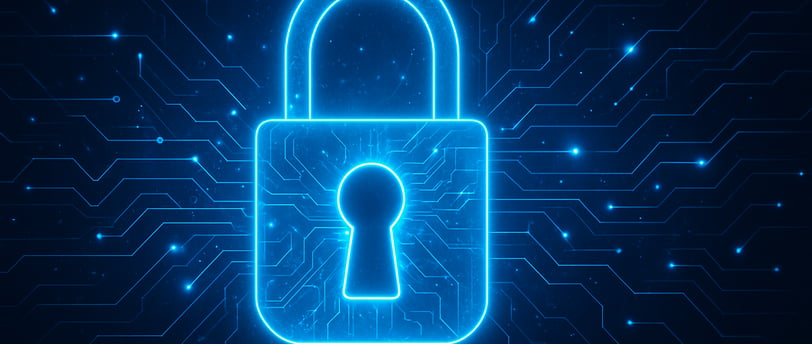Protect Your Personal Data: 2025 Cybersecurity Tips
Protect your personal data in 2025 with simple, effective tips. Discover smart cybersecurity strategies to boost privacy and stay safe from new digital threats.
TIPS & TRICKS
Stephanie Cruise
5/1/20257 min read


Introduction: The Evolving Landscape of Digital Threats in 2025
As we approach 2025, the digital landscape continues to undergo rapid transformations, primarily driven by advancements in technology. These developments, while offering significant benefits, are also accompanied by an alarming increase in digital threats. The combination of widespread internet access, the rise of the Internet of Things (IoT), and the increasing reliance on cloud services has created an environment ripe for cybercriminal activities. According to recent studies, cybercrime is projected to inflict damages totaling over $10 trillion annually by 2025, underscoring the critical need for personal data protection.
The tactics employed by cybercriminals are evolving in sophistication, making it imperative for individuals to adopt proactive strategies to safeguard their personal data. Phishing attacks have become more targeted, utilizing detailed personal information gathered from social media and other online platforms. Data breaches, which have become a common occurrence, affect millions of users worldwide, leading to identity theft and financial loss. Current statistics reveal that approximately 30% of internet users have experienced some form of data breach, highlighting just how prevalent these threats are in today's virtual environment.
Furthermore, the growing importance of online privacy cannot be overstated. With increasing scrutiny from regulatory bodies and public awareness surrounding data protection, individuals must prioritize their privacy alongside their day-to-day online activities. This includes understanding the risks associated with personal information sharing and adopting tools that enhance data security. In an era where digital footprints often dictate personal and economic opportunities, safeguarding personal data should be a priority for everyone. The time to act is now—being informed and equipped with the right knowledge can help mitigate risks associated with digital threats in the coming years.
Understanding the Importance of Personal Data Protection
In today’s digital landscape, the importance of personal data protection cannot be overstated. With the increasing volume of information shared online and the ever-evolving threats posed by cybercriminals, safeguarding personal data is paramount. Personal data encompasses a wide range of information including names, addresses, contact details, social security numbers, financial records, and even biometric data. This sensitive information is often the target of a variety of malicious activities, highlighting the necessity for individuals to adopt robust security measures.
Neglecting personal data protection can lead to dire consequences, with identity theft being one of the most prevalent concerns. Cybercriminals can utilize stolen data to impersonate individuals, opening up credit accounts or making unauthorized purchases, thereby inflicting significant financial damage and emotional distress on victims. Furthermore, financial fraud is another severe risk associated with inadequate protection of personal data. Cyber attackers may exploit compromised information to gain access to banking accounts, leading to unauthorized transactions and a loss of trust in financial systems.
Unauthorized access to accounts is not limited to financial information. Cyber intrusions can grant criminals access to personal emails, social media accounts, and even professional networks. This can facilitate further breaches of privacy and security, allowing attackers to manipulate or exploit trusted relationships. As such, proactive measures for digital security in 2025 are essential to mitigate these risks, not just for the protection of personal information but also for the preservation of professional safety. Individuals and organizations alike must cultivate a culture of vigilance and readiness against potential data breaches. By understanding the importance of personal data protection, we empower ourselves to navigate the digital landscape with greater security and confidence.
Tip 1: Use a VPN for Enhanced Security
A Virtual Private Network (VPN) is an essential tool for enhancing your online security and privacy while navigating the internet. A VPN establishes a secure, encrypted connection between your device and the internet, creating a private tunnel for your data to travel through. This process not only protects your information from potential cyber threats but also allows you to maintain anonymity online by masking your IP address.
The significance of using a VPN lies in its ability to encrypt your data. When you connect to the internet via a VPN, your data is converted into a code that is unreadable to anyone who intercepts it. This encryption is particularly crucial when using public Wi-Fi networks, where cybercriminals often attempt to access sensitive information. By utilizing a VPN, you significantly reduce the risk of identity theft and data breaches, safeguarding your personal information from prying eyes.
Moreover, a reliable VPN can provide additional benefits, such as bypassing geographic restrictions on content and streaming services. Users often find that a VPN grants them access to a broader range of media options by allowing them to connect to servers located in different countries. However, it is essential to choose a reputable VPN service to ensure the protection of your data. Factors to consider include the speed of the connection, privacy policies, and the logging practices of the provider.
When selecting a VPN, prioritize those that do not log your online activities, as this feature is critical for maintaining privacy. Reputable VPN services also offer transparency and customer support, which can enhance your overall experience. By integrating a VPN into your internet usage habits, you can significantly bolster your online security and protect your personal data in 2025 and beyond.
Tip 2: Enable Two-Factor Authentication (2FA)
In an era where cyber threats are increasingly sophisticated, enabling two-factor authentication (2FA) is an essential step in safeguarding your online accounts. Two-factor authentication provides an additional layer of security beyond the conventional username and password combination. When an account is protected by 2FA, users must verify their identity through a second method, significantly reducing the risk of unauthorized access.
2FA operates by requiring users to provide something they know (their password) and something they have (a temporary code sent to their mobile device or generated by an authentication app). For instance, when logging into an account, after entering the password, a user may receive an SMS code or be prompted to enter a code generated by an app like Google Authenticator or Authy. This process ensures that even if a malicious actor acquires your password, they would still need the second factor to access your account.
There are several methods available for implementing 2FA, including SMS text messages, email confirmations, and mobile authentication applications. Each method has its own advantages and drawbacks; for example, while SMS codes are easy to use, they are also susceptible to interception. Conversely, authentication applications are generally more secure, as they generate codes independently on the device and do not rely on network transmission.
Implementing 2FA across all your applications that offer it can profoundly enhance your online privacy protection. By taking this simple action, you strengthen your defenses against potential breaches, thus ensuring greater control over your personal data. Embracing two-factor authentication is not merely a choice but a necessity in today's digital landscape. Safeguard your accounts and take proactive measures to protect your sensitive information by enabling 2FA today.
Manage Your Passwords Wisely
Password management is a critical aspect of securing personal data, especially in an era where cyber threats are becoming increasingly sophisticated. One of the best strategies for enhancing password security is to create strong, unique passwords for each of your accounts. Predictable passwords, such as "123456" or "password," should be avoided as they are easily compromised. Instead, consider using passphrases, which are sequences of words or phrases that form a memorable yet complex password.
When forming passphrases, think of a sentence that is meaningful to you, but would be difficult for others to guess. For example, "MyDogLovesToBarkAtTheMailman!" combines multiple words with capitalization and special characters, making it a robust choice. Additionally, incorporating numbers and symbols can further enhance the security of your passwords. Regularly updating your passwords is another essential practice; changing them every three to six months can significantly reduce the risk of unauthorized access.
To streamline password management and enhance security, utilizing a password manager offers numerous advantages. These applications not only store your passwords securely but also generate complex and unique passwords for you. By using a password manager, you eliminate the necessity of memorizing multiple passwords, thereby reducing the temptation to use simple or repeated passwords across different accounts.
Furthermore, most password managers come equipped with features that notify you about password breaches and unsafe passwords, allowing you to take timely action. This practice can drastically lower the likelihood of falling victim to data breaches caused by weak password practices. Ultimately, by managing your passwords wisely and leveraging technology, you can take significant steps towards safeguarding your personal data in 2025 and beyond.
Tip 4: Avoid Unsecured Public Networks
In today's digitally interconnected world, public Wi-Fi networks have become widely accessible, tempting users to connect without much thought regarding their safety. However, utilizing unsecured public Wi-Fi can expose personal data and sensitive information to various cybersecurity threats. One of the most prevalent risks associated with these networks is the potential for man-in-the-middle attacks, where a malicious actor intercepts communication between the user and the intended destination. Such attacks can allow hackers to access private data, including passwords and financial information.
Data interception is another significant concern with unsecured networks. Cybercriminals often set up rogue hotspots, mimicking legitimate public Wi-Fi services. Unsuspecting users may unknowingly connect to these networks, providing hackers with an easy avenue to harvest sensitive data. Once connected, attackers can monitor online activities and siphon off information without the user's knowledge.
To maintain data security while connected to public Wi-Fi, individuals should adopt several practical measures. First and foremost, whenever possible, consider using mobile data instead of public Wi-Fi for sensitive transactions. Mobile data connections typically offer enhanced security compared to public networks. If using Wi-Fi is unavoidable, avoid conducting sensitive activities such as online banking or shopping, as these can expose critical information.
Furthermore, utilizing a Virtual Private Network (VPN) can significantly enhance security when accessing public networks. A VPN encrypts internet traffic, making it more challenging for attackers to intercept data. This additional layer of security can provide peace of mind while browsing or working in public spaces. Ultimately, by remaining aware of the risks associated with unsecured public networks and employing these safety measures, individuals can better protect their personal data in an increasingly vulnerable online environment.
Conclusion: Taking Charge of Your Online Privacy in 2025
As we delve into 2025, safeguarding personal data is more critical than ever. This blog post has outlined several essential strategies to enhance your cybersecurity and protect your personal information in an increasingly digital landscape. From the importance of using strong, unique passwords to the benefits of two-factor authentication, each step contributes to a more secure online environment. Utilizing virtual private networks (VPNs) and keeping software updated are additional measures that can significantly reduce vulnerabilities and safeguard against potential threats.
Understanding the significance of data encryption ensures that sensitive information remains private, while being cautious about sharing personal details on social media platforms can further prevent unwanted exposure. Implementing these strategies not only fortifies individual security but also cultivates a culture of awareness regarding online privacy. In an era where data breaches are increasingly common, it is essential to remain vigilant and proactive.
Encouragingly, taking charge of one’s online privacy does not have to be overwhelming. Small, consistent actions can yield substantial improvements in data protection. Readers are urged to adopt these cybersecurity tips as part of their routine, ensuring that digital life remains secure and private. Remember, every step taken toward data protection contributes not only to individual security but also fosters a more respected and protected digital community. By staying informed and proactive, individuals can significantly enhance their online privacy and security in 2025 and well beyond.
Discover tips for a balanced, fulfilling lifestyle.
© 2025. All rights reserved.

